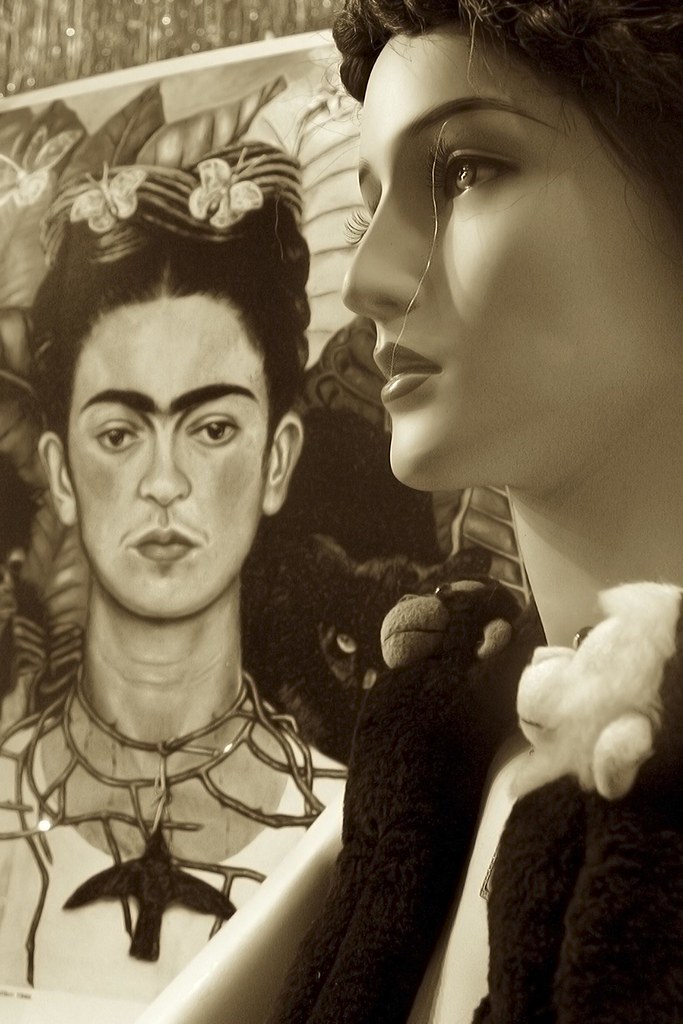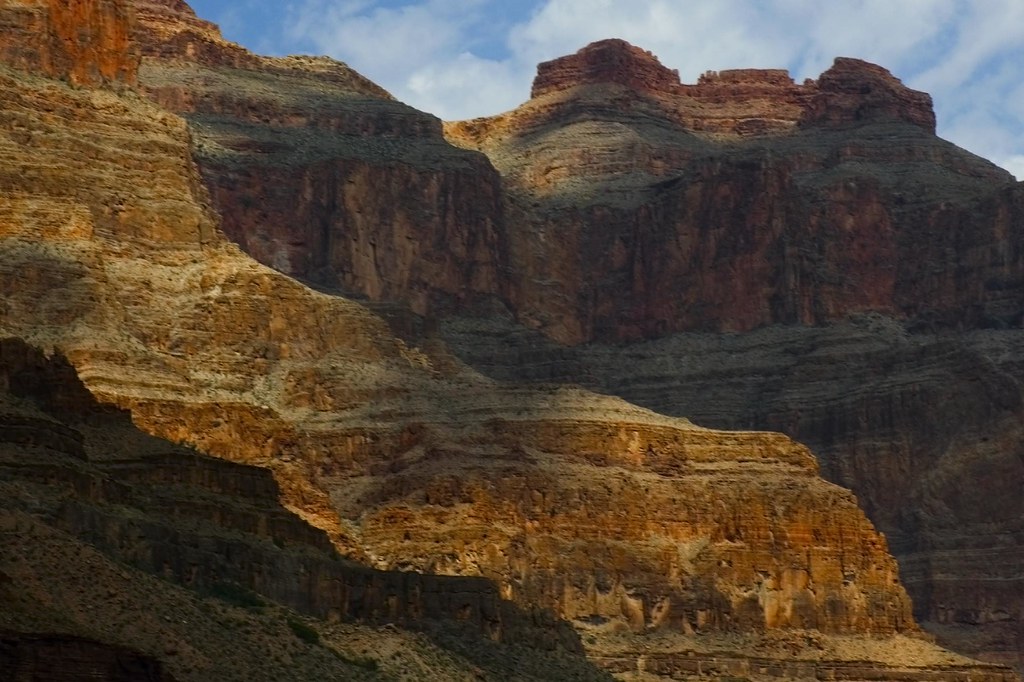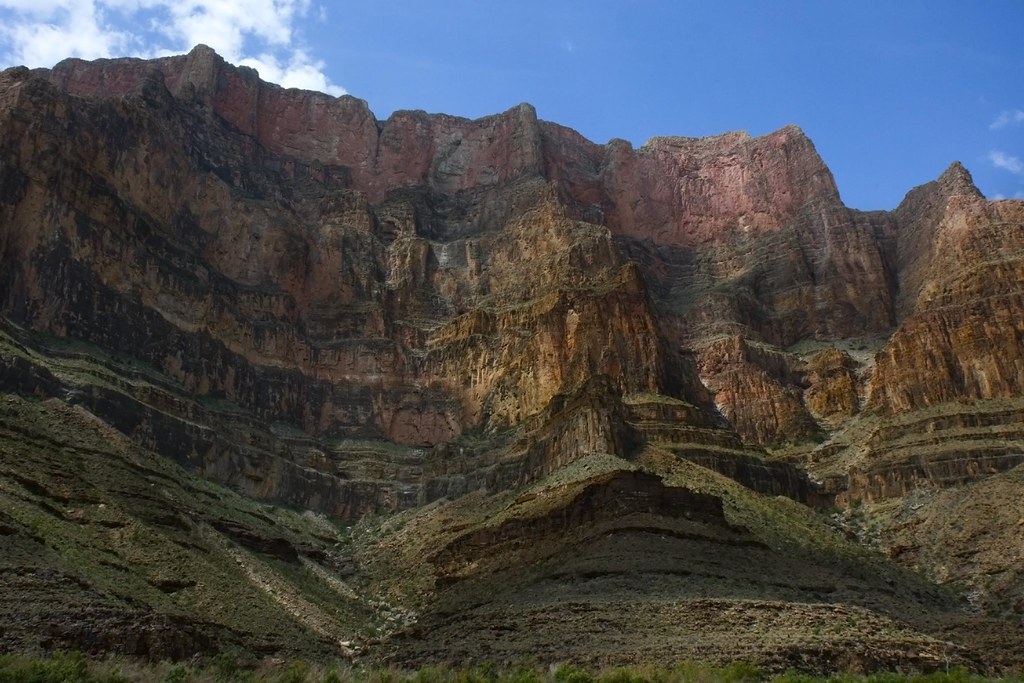The spirit-world around this world of sense
Floats like an atmosphere, and everywhere
Wafts through these earthly mists and vapors dense
A vital breath of more ethereal air.
Our little lives are kept in equipoise
By opposite attractions and desires;
The struggle of the instinct that enjoys,
And the more noble instinct that aspires.
These perturbations, this perpetual jar
Of earthly wants and aspirations high,
Come from the influence of an unseen star,
An undiscovered planet in our sky.
And as the moon from some dark gate of cloud
Throws o'er the sea a floating bridge of light,
Across whose trembling planks our fancies crowd
Into the realm of mystery and night,—
So from the world of spirits there descends
A bridge of light, connecting it with this,
O'er whose unsteady floor, that sways and bends,
Wander our thoughts above the dark abyss.
-- Henry Wadsworth Longfellow, from "Haunted Houses"
"Haunted Houses"
Wednesday, October 31
a bridge of light
Posted by
rb
at
10/31/2007
![]()
Tuesday, October 30
think that you're gliding
Think that you're gliding out from the face of a cliff
like an eagle. Think you're walking
like a tiger walks by himself in the forest.
You're most handsome when you're after food.
-- Rumi
Translated by Coleman Barks
Posted by
rb
at
10/30/2007
![]()
Sunday, October 28
the glance
When I arrived at Picasso's on Rue de la Boétie I was as deeply moved and as full of respect as though I were having an audience with the Pope.
"I have come to see you," I said, "before visiting the Louvre."
"You're quite right" he answered.
I brought a small painting, carefully packed, which was called The Girl of Figuera. He looked at it for at least fifteen minutes, and made no comment whatever. After which we went up to the next story, where for two hours Picasso showed me quantities of his paintings. He kept going back and forth, dragging out great canvases which he placed against the easel. Then he went to fetch others among an infinity of canvases stacked in rows against the wall. I could see that he was going to enormous trouble. At each new canvas he cast me a glance filled with a vivacity and an intelligence so violent that it made me tremble. I left without in turn having made the slightest comment.
At the end, on the landing of the stairs, just as I was about to leave we exchanged a glance which meant exactly,
"You get the idea?"
"I get it!"
-- Salvador Dali The Secret Life of Salvador Dali
Translated by Haakon M. Chevalier
The Girl of Figuera
Posted by
rb
at
10/28/2007
![]()
Friday, October 26
to see the stars
We must unlearn the constellations to see the stars.
-- Jack Gilbert, from "Tear It Down"
Tear It Down
Posted by
rb
at
10/26/2007
![]()
Wednesday, October 24
a turning
Evella and I wandered and wrote you occasionally. I was in a beautiful spell. It was in an autumn and it was a turning round, through light and darkness, under suns and stars, in a fantasy land. The faces of days were disaster and passion. The luminous wind was binding the autumn to the glistening world, blowing it round through trees with a sound of the breaking sea, and the sun was driving summer away, weaving autumn into the world and turning a wheel in Evella and me, turning us towards and turning us away—all love is a turning on a spit, towards, through, and away from flame—and we were like sleepwalkers and Evella would turn to me and say, 'Who are you?' and I would murmur, 'I am you and you are me and we are some rabblement of soul . . .'
-- William Goyen The House of Breath
Posted by
rb
at
10/24/2007
![]()
Sunday, October 21
Nothing Twice
Nothing can ever happen twice.
In consequence, the sorry fact is
that we arrive here improvised
and leave without the chance to practice.
Even if there is no one dumber,
if you're the planet's biggest dunce,
you can't repeat the class in summer:
this course is only offered once.
No day copies yesterday,
no two nights will teach what bliss is
in precisely the same way,
with exactly the same kisses.
One day, perhaps, some idle tongue
mentions your name by accident:
I feel as if a rose were flung
into the room, all hue and scent.
The next day, though you're here with me,
I can't help looking at the clock:
A rose? A rose? What could that be?
Is it a flower or a rock?
Why do we treat the fleeting day
with so much needless fear and sorrow?
It's in its nature not to stay:
Today is always gone tomorrow.
With smiles and kisses, we prefer
to seek accord beneath our star,
although we're different (we concur)
just as two drops of water are.
-- Wislawa Szymborska
Translated by Stanislaw Baranczak and Clare Cavanagh
Wislawa Szymborska
Posted by
rb
at
10/21/2007
![]()
Thursday, October 18
Strings in the Earth and Air (Chamber Music I)
Strings in the earth and air
Make music sweet;
Strings by the river where
The willows meet.
There's music along the river
For Love wanders there,
Pale flowers on his mantle,
Dark leaves on his hair.
All softly playing,
With head to music bent,
And fingers straying
Upon an instrument.
-- James Joyce
the modernist composer Luciano Berio and James Joyce
Posted by
rb
at
10/18/2007
![]()
saturated textures
The sheer expressive force, the Richard Serra-like physical mass of these large-scale, purely instrumental actions can be nigh on overwhelming. In them, Berio arrives at a highly refined late style that is comparable, in terms of its relationship to his total output, to that of Elliott Carter. But where Carter achieves his late-period clarity through a lightening of texture, Berio elucidates the saturated textures that he always favored by relaxing overall tempos & redistributing the constituent parts of the orchestra around the stage. (read more)
-- Tom Myron, on Luciano Berio's orchestral essays
Tom Myron
Posted by
rb
at
10/18/2007
![]()
like verbal taffy
It begins in a hush of mystery, born from a blurry gong. The eight voices emerge harmonizing from the silence, suddenly breaking free in a flurry of muttered syllables and disjointed quotes from the works of Claude Lévi-Strauss, the French anthropologist. Concerned largely with Brazilian water myths, the quotations are used as "poetic fragments," at first articulated over bursts of percussion and waves of amplified harmonizing. Occasionally disrupted by thick clusters of music from the orchestra, the voices unspool their text in dizzying patterns, at times in unison, at others pursuing individual courses, teasing and deforming the words like verbal taffy. The orchestra is never at rest; connecting its periodic explosions with frantic stretches of piano, spasms of vibraphone, warbling flutes, rippling fanfares.... (read more)
-- Allen B. Ruch on Luciano Berio's Sinfonia (and Samuel Beckett)
The Modern Word
Posted by
rb
at
10/18/2007
![]()
Wednesday, October 17
Tuesday, October 16
with its own light
The perfect act is empty. Who can see it? He who forgets form. Out of the formed, the unformed, the empty act proceeds with its own form. Perfect form is momentary. Its perfection vanishes at once. Perfection and emptiness work together for they are the same: the coincidence of momentary form and eternal nothingness. Form: the flash of nothingness. Forget form, and it suddenly appears, ringed and reverberating with its own light, which is nothing. Well, then: stop seeking. Let it all happen. Let it come and go. What? Everything: i.e., nothing.
-- Thomas Merton Cables to the Ace or Familiar Liturgies of Misunderstanding
Posted by
rb
at
10/16/2007
![]()
Monday, October 15
Sonnet 24
Mine eye hath play'd the painter and hath stell'd
Thy beauty's form in table of my heart;
My body is the frame wherein 'tis held,
And perspective it is best painter's art.
For through the painter must you see his skill
To find where your true image pictur'd lies,
Which in my bosom's shop is hanging still,
That hath his windows glazed with thine eyes.
Now see what good turns eyes for eyes have done:
Mine eyes have drawn thy shape, and thine for me
Are windows to my breast, wherethrough the sun
Delights to peep, to gaze therein on thee.
Yet eyes this cunning want to grace their art—
They draw but what they see, know not the heart.
-- William Shakespeare
W.H. Auden on Shakespeare's Sonnets
Posted by
rb
at
10/15/2007
![]()
an angel might come
The peculiar grace of a Shaker chair is due to the fact that it was made by someone capable of believing that an angel might come and sit on it. Indeed the Shakers believed their furniture was designed by angels— and [William] Blake believed his ideas for poems and engraving came from heavenly spirits...
"Imagination," for Blake, is the faculty by which man penetrates ultimate reality and religious mystery. It is completely distinct from "allegorical fantasy."
"I know that this world is a world of imagination and vision [wrote Blake in a letter] ...but everybody does not see alike. To the eyes of a miser a guinea is more beautiful than the sun, and a bag worn with the use of money has more beautiful proportions than a vine filled with grapes. The tree which moves some to tears of joy is in the eyes of others only a green thing that stands in the way. Some see nature all ridicule and deformity, and by these I shall not regulate my proportions, and some scarce see nature at all. But to the eyes of the man of imagination, nature is imagination itself. As a man is, so he sees. As the eye is formed, so are its powers... To me this world is all one continuous vision of fancy or imagination."
-- Thomas Merton, in his introduction to Religion in Wood: A Book of Shaker Furniture by Edward Deming Andrews
The Shakers of Pleasant Hill
Posted by
rb
at
10/15/2007
![]()
Saturday, October 6
Joy
Don't cry, it's only music,
someone's voice is saying;
no one you love is dying.
It's only music. And it was only spring,
the world's unreasoning body
run amok, like a saint's, with glory,
that overwhelmed a young girl
into unreasoning sadness.
Crazy, she told herself,
I should be dancing with happiness.
But it happened again. It happens
when we make bottomless love—
there follows a bottomless sadness
which is not despair
but its nameless opposite.
It has nothing to do with the passing of time.
It's not about loss. It's about
two seemingly parallel lines
suddenly coming together
inside us, in some place
that is still wilderness.
Joy, joy, the sopranos sing,
reaching for the shimmering notes
while our eyes fill with tears.
-- Lisel Mueller
Lisel Mueller
Posted by
rb
at
10/06/2007
![]()
the music of what happens
There is a twofold confusion that bedevils the reading of poetry. The first is the reading of poetry as articulated intention; that is to say, imagining that the poet intended to mean some specific bare thing, then sat down to dress it up in pretty, graceful, elegant forms that you could then strip away to find the naked meaning. Fancy talk. No wonder the plain-spoken sometimes hate and distrust it. Plain speech, if such a thing truly exists, is fine for instrumental and moral purposes but is of little use in registering experience as such. Plain speech is in fact never quite as plain as it seems. Tell me what you really mean, the plain-spoken demand. But a poem does not have a meaning that it then disguises: it discovers meaning in the process of being written and read, much as people discover meaning in places, in sensations, in other people. The poet has a broad subject, but he cannot know what line or what word will come next in his poem. The poet listens as intently as he speaks and sings.
The second confusion springs from the first. It involves the reading of poetry primarily in order to find out about the poet as a person in real life. This involves reading the poem as symptom or evidence. Poetry is useless as evidence. As far as I know, no poem has ever been adduced as evidence in court. The truths the poem deals with are not evidentiary truths. Truths they are, and deep truths at that, but they are not in the form of falsifiable statements such as science or law demands. They do not lead back to the real life outside the poem: the truths refer to the real life inside the poem...
Poetry is not symptom or evidence but state: it is not the result of what happened before but the music of what happens, and it is dangerous ever to forget that. The selves that inhabit poems are imagined selves, products of the imagination, and their great power derives from their ability to spread through our own imaginations like a music that is strictly itself. The life that moves in poems has enormous sharpness because it has been distilled into such a state that it is no longer possible to distinguish the universal from the particular in it. The real life in poems comes at us with the sudden clear cry of particularity as any phenomenon might, but it does not conduct us into the world of cause and effect, the world of biography. Biography is secondary to history, and history is secondary to those brilliant moments of perception that mere existence makes possible. There it is possible to be playful in the midst of tragedy, to pun on sickness and death itself.
-- George Szirtes "Missing Dates/Sleeve Notes" Poetry October 2007
George Szirtes
Poetry
Posted by
rb
at
10/06/2007
![]()
Friday, October 5
I would like to paint the way a bird sings.
-- Claude Monet the artist speaks ed. Genevieve Morgan
Posted by
rb
at
10/05/2007
![]()
The Coming of Light
Even this late it happens:
the coming of love, the coming of light.
You wake and the candles are lit as if by themselves,
stars gather, dreams pour into your pillows,
sending up warm bouquets of air.
Even this late the bones of the body shine
and tomorrow's dust flares into breath.
-- Mark Strand
via Whiskey River
Posted by
rb
at
10/05/2007
![]()
Wednesday, October 3
The fact is, the public make use of the classics of a country as a means of checking the progress of Art. They degrade the classics into authorities. They use them as bludgeons for preventing the free expression of Beauty in new forms. They are always asking a writer why he does not write like somebody else, or a painter why he does not paint like somebody else, quite oblivious of the fact that if either of them did anything of the kind he would cease to be an artist.
-- Oscar Wilde The Soul of Man
The Soul of Man
Posted by
rb
at
10/03/2007
![]()
Tuesday, October 2
Work on good prose has three steps: a musical stage when it is composed, an architectonic one when it is built, and a textile one when it is woven.
-- Walter Benjamin One-Way Street
via About Last Night
Posted by
rb
at
10/02/2007
![]()
Lee Miller

Rene Magritte by Lee Miller
The Art of Lee Miller
Video with Tony Penrose
via Conscientious
also The surreal goddess
Posted by
rb
at
10/02/2007
![]()
Monday, October 1
XXVI
The world washed in his imagination,
The world was a shore, whether sound or form
Or light, the relic of farewells,
Rock, of valedictory echoings,
To which his imagination returned,
From which it sped, a bar in space,
Sand heaped in the clouds, giant that fought
Against the murderous alphabet:
The swarm of thoughts, the swarm of dreams
Of inaccessible Utopia.
A mountainous music always seemed
To be falling and to be passing away.
-- Wallace Stevens, from The Man with the Blue Guitar
The Man with the Blue Guitar
Posted by
rb
at
10/01/2007
![]()












